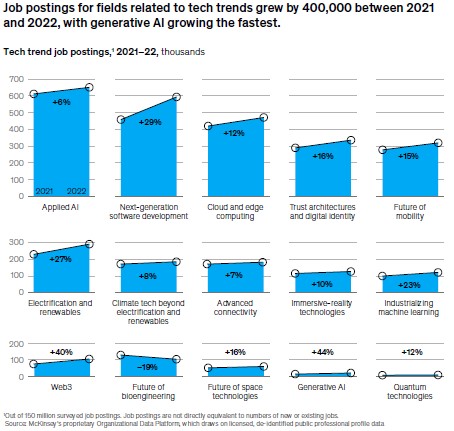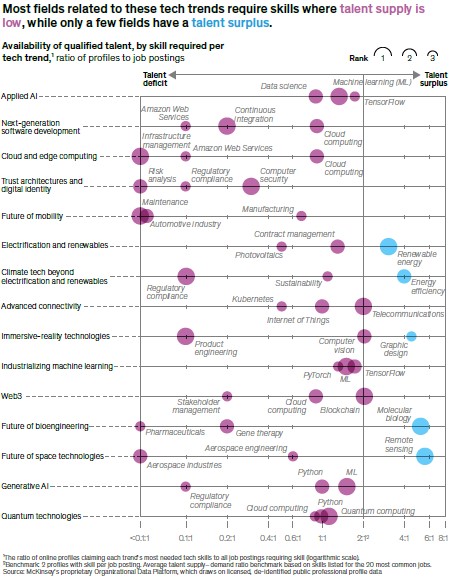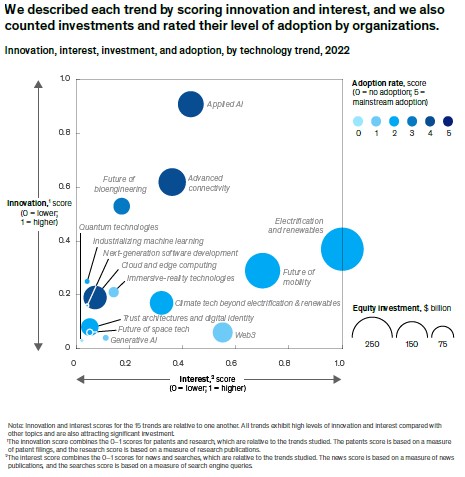
Although we can mock consulting houses, their research can prove incredibly useful. This is why I’ve just put McKinsey’s top 15 technology trends report at the top of my inbox. Here is the summary
McKinsey Technology Trends Outlook 2023
After a tumultuous 2022 for technology investment and talent, the first half of 2023 has seen a resurgence of enthusiasm about technology’s potential to catalyse progress in business and society …
All of last year’s trends remain on our list, though some experienced accelerating momentum and investment, while others saw a downshift. One new trend, generative AI, made a loud entrance and has already shown potential for transformative business impact.
This new entrant represents the next frontier of AI. Building upon existing technologies such as applied AI and industrializing machine learning, generative AI has high potential and applicability across most industries. Interest in the topic (as gauged by news and internet searches) increased threefold from 2021 to 2022 …
Generative AI and other foundational models change the AI game by taking assistive technology to a new level, reducing application development time, and bringing powerful capabilities to nontechnical users. Generative AI is poised to add as much as $4.4 trillion in economic value from a combination of specific use cases and more diffuse uses—such as assisting with email drafts—that increase productivity. Still, while generative AI can unlock significant value, firms should not underestimate the economic significance and the growth potential that underlying AI technologies and industrializing machine learning can bring to various industries.
Investment in most tech trends tightened year over year, but the potential for future growth remains high, as further indicated by the recent rebound in tech valuations. Indeed, absolute investments remained strong in 2022, at more than $1 trillion combined, indicating great faith in the value potential of these trends.
Trust architectures and digital identity grew the most out of last year’s 14 trends, increasing by nearly 50 percent as security, privacy, and resilience become increasingly critical across industries. Investment in other trends—such as applied AI, advanced connectivity, and cloud and edge computing—declined, but that is likely due, at least in part, to their maturity.
More mature technologies can be more sensitive to short-term budget dynamics than more nascent technologies with longer investment time horizons, such as climate and mobility technologies. Also, as some technologies become more profitable, they can often scale further with lower marginal investment. Given that these technologies have applications in most industries, we have little doubt that mainstream adoption will continue to grow.
Organisations shouldn’t focus too heavily on the trends that are garnering the most attention. By focusing on only the most hyped trends, they may miss out on the significant value potential of other technologies and hinder the chance for purposeful capability building. Instead, companies seeking longer-term growth should focus on a portfolio-oriented investment across the tech trends most important to their business.
Technologies such as cloud and edge computing and the future of bioengineering have shown steady increases in innovation and continue to have expanded use cases across industries. In fact, more than 400 edge use cases across various industries have been identified, and edge computing is projected to win double-digit growth globally over the next five years.
Additionally, nascent technologies, such as quantum, continue to evolve and show significant potential for value creation. Our updated analysis for 2023 shows that the four industries likely to see the earliest economic impact from quantum computing—automotive, chemicals, financial services, and life sciences—stand to potentially gain up to $1.3 trillion in value by 2035.
By carefully assessing the evolving landscape and considering a balanced approach, businesses can capitalize on both established and emerging technologies to propel innovation and achieve sustainable growth.
Tech talent dynamics
We can’t overstate the importance of talent as a key source in developing a competitive edge. A lack of talent is a top issue constraining growth. There’s a wide gap between the demand for people with the skills needed to capture value from the tech trends and available talent: our survey of 3.5 million job postings in these tech trends found that many of the skills in greatest demand have less than half as many qualified practitioners per posting as the global average.
Companies should be on top of the talent market, ready to respond to notable shifts and to deliver a strong value proposition to the technologists they hope to hire and retain. For instance, recent layoffs in the tech sector may present a silver lining for other industries that have struggled to win the attention of attractive candidates and retain senior tech talent. In addition, some of these technologies will accelerate the pace of workforce transformation.
In the coming decade, 20 to30 percent of the time that workers spend on the job could be transformed by automation technologies, leading to significant shifts in the skills required to be successful. And companies should continue to look at how they can adjust roles or upskill individuals to meet their tailored job requirements. Job postings in fields related to tech trends grew at a very healthy 15 percent between 2021 and 2022, even though global job postings overall decreased by 13 percent. Applied AI and next-generation software development together posted nearly one million jobs between 2018 and 2022. Next-generation software development saw the most significant growth in number of jobs (Exhibit 1).
This bright outlook for practitioners in most fields highlights the challenge facing employers who are struggling to find enough talent to keep up with their demands. The shortage of qualified talent has been a persistent limiting factor in the growth of many high-tech fields, including AI, quantum technologies, space technologies, and electrification and renewables. The talent crunch is particularly pronounced for trends such as cloud computing and industrializing machine learning, which are required across most industries. It’s also a major challenge in areas that employ highly specialized professionals, such as the future of mobility and quantum computing (Exhibit 2).
The 15 tech trends
This report lays out considerations for all 15 technology trends. We grouped them into five broader categories to make it easier to consider related trends: the AI revolution, building the digital future, cutting-edge engineering, compute and connectivity frontiers, and a sustainable world. Of course, when considering trend combinations, there’s significant power and potential in looking across these groupings.
To describe the state of each trend, we developed scores for innovation (based on patents and research) and interest (based on news and web searches). We also counted investments in relevant technologies and rated in relevant technologies and rated their level of adoption by organizations (Exhibit 3).
You can download and read the full report here.
Chris M Skinner
Chris Skinner is best known as an independent commentator on the financial markets through his blog, TheFinanser.com, as author of the bestselling book Digital Bank, and Chair of the European networking forum the Financial Services Club. He has been voted one of the most influential people in banking by The Financial Brand (as well as one of the best blogs), a FinTech Titan (Next Bank), one of the Fintech Leaders you need to follow (City AM, Deluxe and Jax Finance), as well as one of the Top 40 most influential people in financial technology by the Wall Street Journal's Financial News. To learn more click here...




